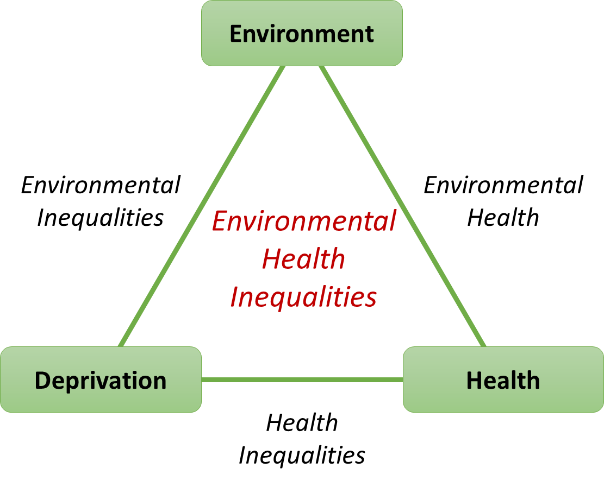Context
There is an increasing body of evidence showing that environmental stressors can increase the risk of illness and premature mortality. For example, particulate matter triggers lung cancer and noise increases the risk of heart attack. Conversely, the natural environment can also enhance health, e.g., contact with nature in parks and gardens (green spaces) is associated with increased physical activity, reduced stress and improved well-being. Consequently, governments worldwide aim to mitigate the negative health effects of environmental exposures and secure environmental health benefits. As exposures are not equal among all segments of the population, it is furthermore important to understand and mitigate inequalities in environmental health.
In Belgium, however, there is currently no systematic monitoring of environmental health inequalities, nor are there tailored tools to assess the impact of policy measures on the extent of and inequalities in environmental burden of disease. In part, this situation is the result of both the important data needs and the methodological challenges in developing such a system.
Objectives
The overall objectives of ELLIS are to develop tools to a) monitor the extent of socioeconomic differences in environmental burden of disease; and b) assess the impact of policy measures on environmental health inequalities.
To achieve this goal, ELLIS will integrate the three dimensions of environmental health inequalities – i.e., socioeconomic deprivation, environmental exposures, and health outcomes. Pairwise integration of these dimensions gives rise to three concepts – i.e., health inequalities, environmental inequalities, and environmental health. Each of these concepts has been well described in national and international literature; however, the integration of all three, leading to environmental health inequalities, has so far received little attention. To increase flexibility and sustainability, the integration of these dimensions will take place at the level of the statistical sector (i.e., the smallest administrative subdivision of Belgium). In addition to monitoring the situation, ELLIS will allow simulating the potential impact of alternative policy scenarios on the extent of and inequalities in environmental burden of disease. Stakeholders will be pro-actively involved in order to identify the most appropriate scenarios and to facilitate knowledge transfer.

Impacts
ELLIS will lead to a number of innovations relevant for Belgian policy-making and society:
- Development of an area-level index of multiple deprivation for use in policy-making.
- Integration of environmental stressors in the Belgian National Burden of Disease framework to allow for continuous monitoring of environmental burden of disease.
- Development of a tool for monitoring environmental (health) inequalities.
- Development and application of a health impact assessment tool for mitigating environmental (health) inequalities.
Additionally, the project will yield a number of research innovations:
- Consolidation of the concept of environmental health inequalities.
- Assessment of methodologies apt to address multiple environmental exposures.
- Integration of health inequalities in health impact assessment.
- Insights in the potential for ecological bias in environmental (health) inequalities.


